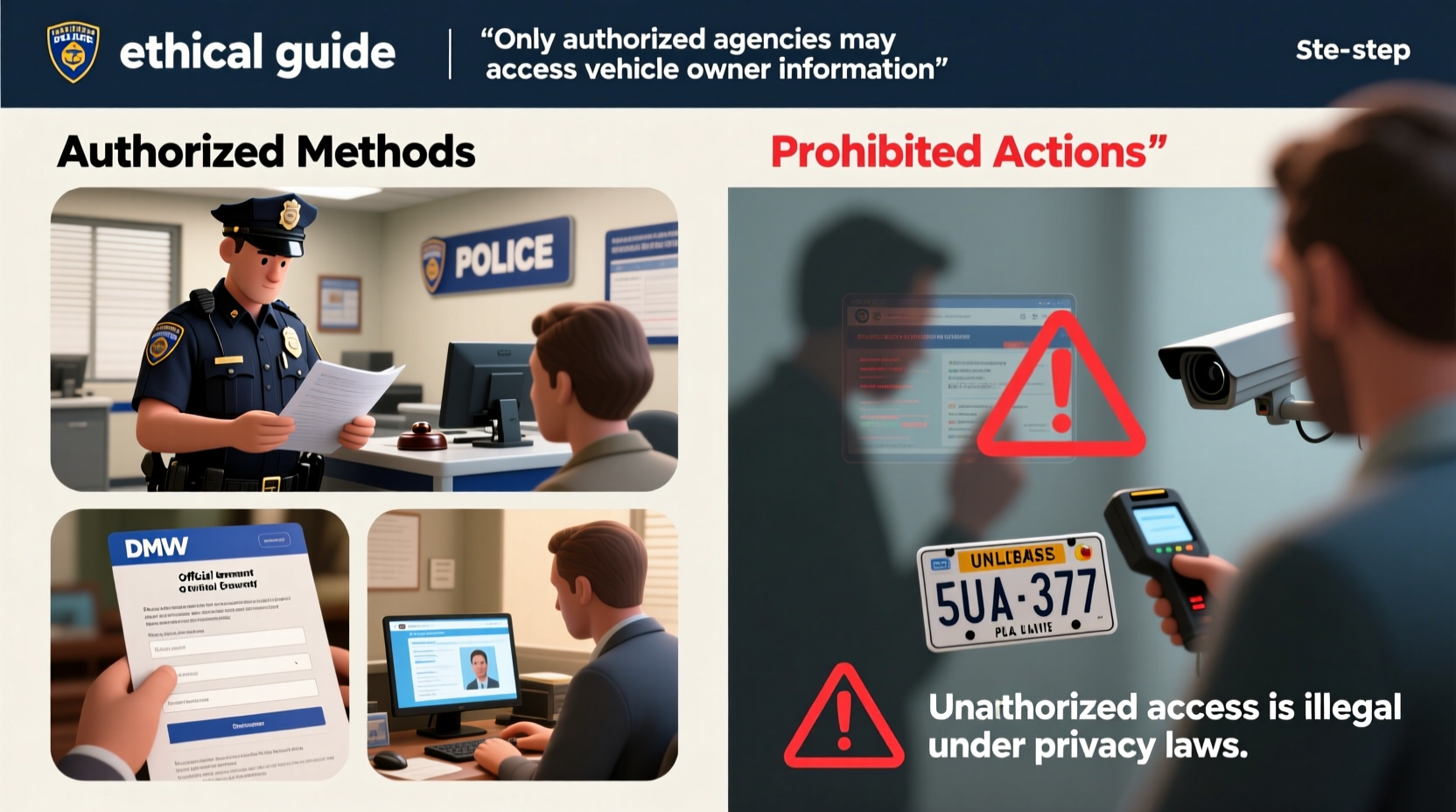Finding the owner of a license plate is a common concern for many drivers. Whether you’ve been involved in a minor collision where the other party left the scene, witnessed unsafe driving, or are trying to return a lost item left in a parking lot, knowing who owns a vehicle can be crucial. However, privacy laws strictly regulate access to personal information tied to license plates. Attempting to obtain this data through unauthorized means can lead to legal consequences. The key lies in understanding what is legally permissible and which official channels can assist.
In the United States and many other countries, vehicle registration details—including the registered owner’s name, address, and contact information—are considered protected data under laws like the Driver’s Privacy Protection Act (DPPA). This means you cannot freely look up someone’s identity just by entering a license plate into a search engine. But that doesn’t mean there are no legitimate paths forward. With the right approach, persistence, and respect for privacy, it is possible to identify a vehicle’s owner when justified by necessity and legality.
Understanding Legal Restrictions and Privacy Laws

The DPPA, enacted in 1994, restricts access to personal information collected by motor vehicle departments. Under this law, Departments of Motor Vehicles (DMVs) are prohibited from disclosing driver information to the general public without a permissible purpose. These purposes include law enforcement, insurance claims, court proceedings, and vehicle recalls.
Private individuals cannot request full registration details from a DMV simply out of curiosity or personal dispute. Unauthorized use of such data can result in civil penalties and even criminal charges. For example, using a third-party service that claims to provide instant owner lookup may violate federal law if that service accesses DMV databases without authorization.
“Access to motor vehicle records is not a public right—it’s a privilege granted only under specific, lawful circumstances.” — Sarah Lin, Privacy Law Analyst at the National Highway Traffic Safety Board
This framework ensures that sensitive data remains secure while still allowing access for legitimate needs. Understanding these boundaries is the first step toward a lawful inquiry.
Step-by-Step Guide: How to Legally Identify a Vehicle Owner
If you have a valid reason to trace a license plate, follow this structured process to remain compliant with the law:
- Document the Incident: Record the license plate number, date, time, location, vehicle description (make, model, color), and any relevant behavior. Photos or video footage strengthen your case.
- Determine Your Purpose: Ask whether your reason qualifies under DPPA exceptions—such as safety, damage, theft, or legal action. Personal grievances do not qualify.
- Contact Local Law Enforcement: If the situation involves hit-and-run, reckless driving, or suspicious activity, report it to the police. Provide all documentation. Officers can run the plate through official channels.
- File a Police Report: Even if the incident seems minor, a formal report creates a record and may prompt further investigation.
- Work Through Insurance (if applicable): In cases of property damage or accidents, your insurer can request owner details through legal channels as part of a claim investigation.
- Request Information via DMV (under eligible cause): Some states allow citizens to submit a written request for vehicle owner information if they were involved in an accident. Forms vary by state and require proof of incident.
Authorized Alternatives and Public Resources
While direct access to owner data is restricted, several indirect but legal tools exist:
- Towing and Parking Authorities: If a vehicle is parked illegally on private property, towing companies can legally identify the owner through standard procedures and contact them or remove the vehicle.
- Vehicle-for-Sale Platforms: If the car has a for-sale sign with a phone number, you might reach the owner indirectly. Never use spoofed numbers or fake inquiries to extract information.
- Reverse License Plate Services (Use with Caution): Some online services claim to offer reverse lookups. While a few operate within legal boundaries by aggregating publicly reported incidents (e.g., vehicles seen in traffic camera footage), most lack proper authorization. Avoid paying for such services unless they clearly state compliance with DPPA.
| Method | Legal? | When to Use | Risks |
|---|---|---|---|
| Police Report Submission | Yes | Hit-and-run, harassment, stolen property | None, if truthful |
| Insurance Claim Inquiry | Yes | Accident or damage involving the vehicle | Requires policy involvement |
| DMV Request (with form) | Conditional | After documented incident in some states | May be denied without proof |
| Online Reverse Lookup | Rarely | Not recommended for personal identification | Privacy violation, scams |
| Hiring a Licensed Investigator | Yes | Legal disputes, missing persons | Cost, must verify credentials |
Mini Case Study: Recovering Damage Costs After a Parking Lot Incident
In early 2023, Maria Lopez, a resident of Austin, Texas, returned to her car to find a deep scratch along the driver’s side. A nearby security camera captured a silver SUV pulling away just before she arrived. She noted the license plate and filed a report with local police. Though officers initially said they couldn’t act without more evidence, Maria submitted dashcam footage from her car—which had been parked across the aisle—and included timestamped images.
Within 48 hours, the police contacted the registered owner through DMV channels. It turned out the driver had accidentally backed into Maria’s car while distracted. Because the incident was reported promptly and supported by evidence, the owner cooperated fully, and their insurance covered the repair costs. Maria avoided confrontation and resolved the matter legally—all because she followed proper protocol instead of attempting to confront the driver herself or resorting to illegal lookup tools.
Checklist: What You Should Do When You Need to Find a License Plate Owner
- ✅ Note the license plate number clearly and double-check spelling
- ✅ Record time, date, and exact location of the incident
- ✅ Take photos or video if possible (include surrounding landmarks)
- ✅ Assess whether your reason qualifies as a lawful purpose (safety, damage, crime)
- ✅ Contact local police or highway patrol with your evidence
- ✅ File a formal report if necessary
- ✅ Involve your insurance company if property damage is involved
- ✅ Avoid confronting the individual directly unless law enforcement advises it
- ✅ Never use unverified websites or pay for “instant” owner reports
FAQ
Can I look up a license plate owner online for free?
No legitimate free service provides access to registered owner details due to privacy laws. Websites claiming to do so often misuse data or are scams. Always rely on official channels like law enforcement or your DMV.
What should I do if someone refuses to give their information after a minor accident?
Write down their license plate, vehicle description, and any identifying features. Immediately report the incident to the police. In many states, failing to exchange information after an accident is a legal offense.
Are rental cars traceable through license plates?
Yes, but the registered owner will be the rental company, not the driver. Law enforcement can obtain renter information if needed for investigations. As a private citizen, you cannot access renter details directly.
Conclusion: Acting Responsibly and Within the Law
While the desire to identify a vehicle owner is understandable, especially after a frustrating or harmful incident, the path forward must respect legal and ethical boundaries. Jumping to conclusions or using illicit methods can backfire, leading to liability or wasted effort. Instead, focus on gathering solid evidence and leveraging authorized systems—police, insurance, and DMV—to achieve resolution.
Every state has slightly different rules about accessing vehicle records, so researching your local regulations can also help. By acting responsibly, you protect not only yourself but also the integrity of public safety systems. If you’ve been affected by a vehicle-related issue, start with a calm assessment, document everything, and proceed through official avenues.









 浙公网安备
33010002000092号
浙公网安备
33010002000092号 浙B2-20120091-4
浙B2-20120091-4
Comments
No comments yet. Why don't you start the discussion?